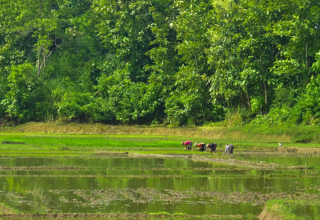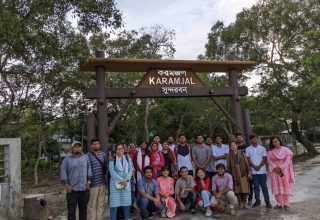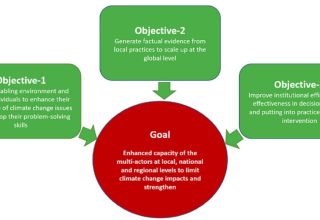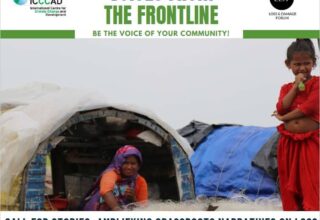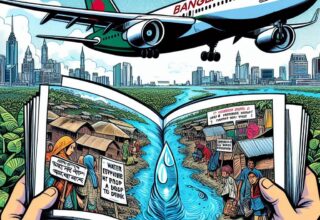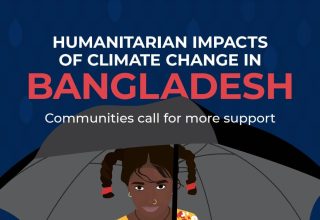The Centro Ecológico’s project is very important to me and to the Guarani communities. Within this project, we’ve managed to strengthen the Guarani people’s culture in the northern coast of Rio Grande do Sul. Through the project, we’re advancing agroforestry across the territory. Communities are getting quite active, as a result of this endeavor. Agroforestry is already a part of the Guarani people’s culture. However, we’re facing a difficult situation because the Guarani people work, but they need support and resources. Through this project, significant progress has been made, even in seeking other partners”- mentioned by Hélio Gimenes (Mbya Guarani Indigenous People) one of the participants of this initiative.
In the vast landscape that is home to the great Amazon Rainforest in Brazil, the impacts of climate change are evident just like in many other countries of the world. Lowered crop yields impact local economies and jeopardize food security. In the face of these challenges, André Luiz Gonçalves and his organization, Centro Ecológico, have been working at the forefront of sustainable agricultural advancements for more than three decades. Rooted in their commitment to sustainable agriculture, gender empowerment and working with indigenous communities, they have been working with smallholder farmers in Brazil. They aim to transform communities and implement sustainable food solutions.
The challenges smallholder farmers face have become more difficult in the region due to the escalating frequency and severity of climate-related disasters, and the increasing price of agricultural goods. This inspired André and his team to plan an innovative initiative that would leave an unforgettable mark. In order to provide a sustainable response to a complex web of problems, Centro Ecologico applied and received a grant from the UNDP-Adaptation Fund Climate Innovation Accelerator (AFCIA), which aims to foster and accelerate innovative technologies, practices and business models for local adaptation through tapping into the incredible potential of NGOs, civil society, women and young innovators.
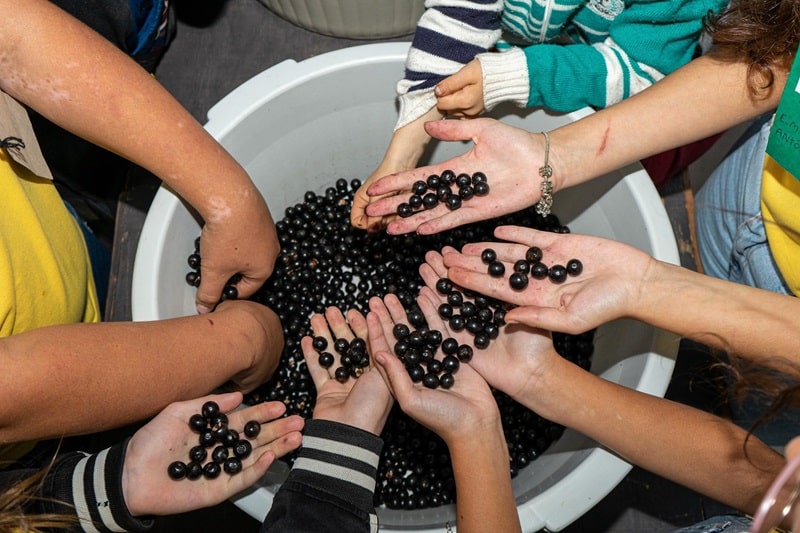
Centro Ecologico envisioned this solution as a pathway where income generation and environmental conservation intertwined seamlessly. The cornerstone of the project was to harmoniously grow açaí berries within an innovative agro-forestry systems.
Their approach was not one-dimensional, but a holistic endeavor that touched upon various aspects of sustainability. An example of holistic endeavor is how they collaborate with communities and indigenous groups. By collaborating closely with rural communities, especially the indigenous groups and farmers, they tapped into a wealth of traditional wisdom while introducing innovative techniques. Their farmer social-technical networks, encompassing a network of 1,000 farmers, fostered knowledge-sharing through dialogues in participatory ways that amplified their collective wisdom. Essentially these dialogues involved women farmers and Mbya Guarani communities, incorporating their traditional knowledge and practices and facilitating the exchange of best practices, innovative methods, and solutions to common challenges.
Recognising that nature thrives on diversity, they mirrored this principle in their agricultural practices. This strategy guaranteed that even during difficult situations like intense rain or crop failure, contingency plans would be readily available. Hélio, an indigenous representative of the Mbya Guarani community, shared how the project transformed their lives. “We used a mortar and pestle to process juçara fruit (açaí) for our own consumption but now, thanks to Centro Ecológico’s support, we have equipment to produce efficiently. This came through the project and we’ve structured ourselves to support our families and communities.,” he said. “This support is not only here in our village, Guyra Nhendu (in guarani language), but also from other villages. Young people are coming from other communities, participating in workshops, learning to climb palm trees, and making açaí. They leave the stored açaí here and come back later to make juice or smoothies to eat. During meetings and gatherings, the “juçara açaí is also appreciated”, he added.
“The organization’s vision encompassed more than just agriculture, it extended to gender empowerment and inclusion”
The organization’s vision encompassed more than just agriculture, it extended to gender empowerment and inclusion. André continuously stresses the importance of women’s roles in their work, evident in their partnerships with women’s groups and their active participation in movements like the Movement of Peasant Women. The journey was about challenging patriarchal structures, promoting inclusivity, and fostering environments where women and men thrive together.
The transformative power of their work is how the organization has been guiding farmers like Anelise Becker who said -Today the agroindustry is an example in the production of juçara and other native fruits, due to the fundamental role that Centro Ecológico has played. The expert technicians have trained us and encouraged us to do the work that we do, which not only protects the forests but also increases our income and supports our environmental conservation efforts, in the production of juçara as a whole and to feel part of it. Guided by Centro Ecológico’s technical assistance, she embraced regenerative practices, safeguarding forests while bolstering her income potential. Her success reverberated across her community, creating a ripple effect that encouraged others to follow suit. This journey of one woman highlighted the collective impact of Centro Ecológico’s leadership.
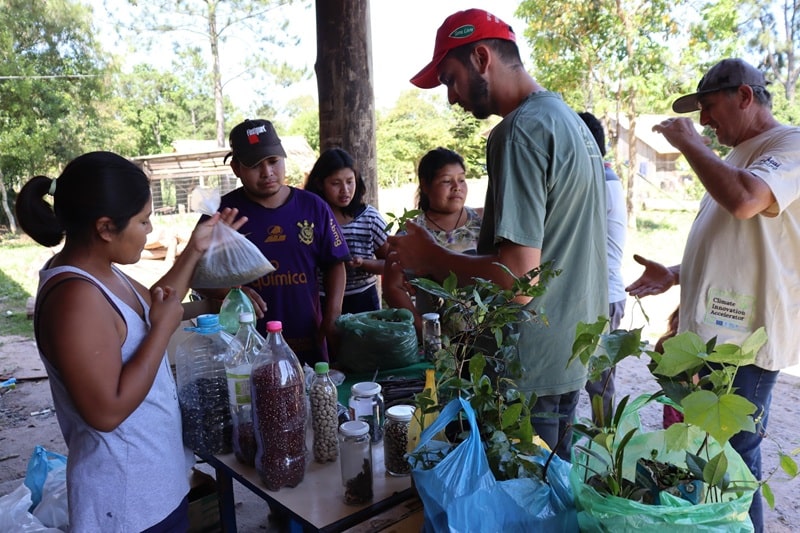
Yet, the journey wasn’t without challenges. Ensuring predictable funding is a big obstacle for many grassroots organizations. However, the UNDP-AFCIA grant provided a lifeline, enabling them to expand their impact. By hiring crucial personnel, they were able to further their mission. Their work made a lasting impact influencing policies and perspectives. They proved that even small grants could be a catalyst for monumental shifts.
André sees bridges of transformation linking communities that value sustainable agriculture, gender equality, and the environment. Centro Ecológico’s legacy is integrated into the very grains of the terrain they have cultivated, from their innovative approach to acai harvesting to their efforts to empower women and indigenous people. André’s journey, alongside Centro Ecológico’s, reiterates that it’s not the size of the grant, but the depth of purpose that matters. The acai they planted has grown sturdy, promoting a more sustainable future for communities, where resilience blooms against adversity and the seeds of transformation continue to flourish.
This article is based on the interview of Andre Luiz who holds a Master’s degree in Sustainable Agriculture from Imperial College London and a PhD in Natural Resources from Cornell University. For over 30 years, he has been actively engaged with a local NGO in Brazil, dedicated to transitioning farmers from conventional to organic agriculture. Furthermore, he serves as a professor in addition to his other roles and responsibilities.
Authors: Rukhsar Sultana is working as a researcher and development practitioner at an NGO based in Dhaka.
This story has been co-created with the support from ICCCAD, UNDP and Centro Ecologico, in the framework of the UNDP managed – Adaptation Fund Climate Innovation Accelerator (AFCIA). The UNDP AFCIA programme counts with the financial contributions from the Adaptation Fund and the European Union, and has awarded 44 micro and small grants to locally-led organizations across 33 countries worldwide, accelerating their innovative solutions to build resilience in the most vulnerable communities.
UNDP-AFCIA, is one of the funding windows anchored under the Adaptation Innovation Marketplace (AIM), a multi-stakeholder strategic platform that promotes scaled-up adaptation at the local level, launched by UNDP Administrator Achim Steiner at the Climate Adaptation Summit in January 2021.


